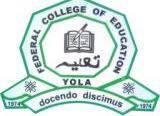Who We Are
The history of the Federal College of Education, Yola dates back to 1974 when the Federal Ministry of Education planned to open three Federal Advanced Teachers’ Colleges (later to be known as Federal Colleges of Education) to produce well qualified middle-level teachers for Nigerian Secondary Schools. The Colleges were established to train teachers for three years, at the end of which the successful ones would be awarded the Nigeria Certificate in Education (NCE).
The College was charged with the responsibility of providing full-time courses in the sciences, vocational education, arts and social sciences as well as the professional preparation of teachers for the award of NCE. It was expected to organize workshops, seminars, conferences and in service courses to up-date and widen the academic and professional knowledge of practicing teachers. The college was also expected to engage in research and the application of theoretical knowledge to concrete situations for the overall development of the country.
By September, 1974, all the recruited staff and principal officers had already started working in the college. Students could not be admitted for the 1974/75 session due to lack of classrooms and hostel accommodation. However, the first set of one hundred and fifty-five (155) students were admitted during the 1975/76 session. Today the college has a student population of 7,078. However, from 1976 to date, the college had graduated a total of twenty two thousand five hundred and twenty (22, 520) students.
With the promulgation of the Federal Colleges of Education decree No. 4 of 1986, the college became autonomous. The College however began to enjoy real autonomy with the promulgation of the National Commission for Colleges of Education (NCCE) degree No. 3 of 1989.
Mr. C. Pollock (1974-82) a Briton, was the pioneer principal of the college. Other provosts of the college were:
Chief M.C Okoye (1983 – 84)
Mr. W.O. Shittu (1984 – 86)
Professor Gidado Tahir (1987 – 94)
Mr. Samuel M. Gogura (Ag. Provost) January 1995 – May 1995
MallamSa’ad B. Jika (Ag. Provost) June 1995 – March 1996
Professor Mustapha Abba (1996 – 2004)
Dr. Aminu Chiroma (2004-2012)
Professor Abdul-Mumin Sa’ad (2012-2020).
Mr. Johnson Blo Malgwa (Ag. Provost) (2020-to date).
Since the College attained autonomy it had four (4) substantive Provosts and four (4) Ag. Provosts. The College also had six (6) various Governing Councils. The tenure of the sixth (6th) Council elapsed in May, 2020. The 7th Council was inaugurated by the Honourable Minister of Education Mallam Adamu Adamu on 20th April, 2021. The College has seven (7) Schools, with forty-one (41) academic departments, five (5) Directorates and the Consultancy Services limited as well as the Centre of Excellence.
The seven (7) Schools are:-
School of Secondary Education: Arts and Social Sciences Programmes.
School of General Education.
School of Secondary Education: Languages Programmes.
School of Secondary Education: Sciences Programmes.
School of Secondary Education: Vocational Education Programmes.
School for Adult, Non-Formal and Special Education.
School of Early Childhood Care and Primary Education (ECC&PED).
Furthermore, the College also runs Nine (9) Degree programmes, on full time basis under the affiliation arrangements with the University of Maiduguri. The approval to commence undergraduate courses was granted in 2013 by the National Universities Commission (NUC), upon the recommendation of the NCCE, after series of resource inspection visits by teams from the NUC, the NCCE and the University of Maiduguri.
The undergraduate programmes took off in the 2014/2015 session with 399 students. All the programmes have been assessed and had received NUC Accreditation before the graduation of the 1st Set in 2018.
Like other Universities the world over, this institution strives to ensure that its products receive quality programmes. To this end, it had always subjected itself to the “peer review” of its programs. Curricula developed are of relevance to the nation as well as being up to date with modern academic trends. Council’s supervision in matters of finance and discipline of staff also ensure that this University is accountable to the University system.
